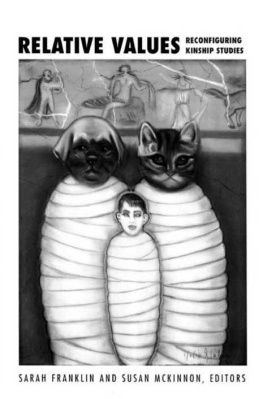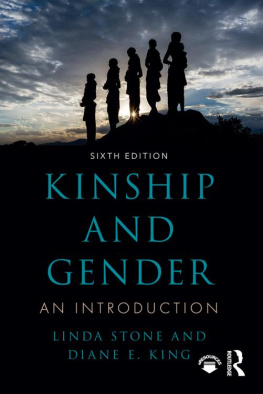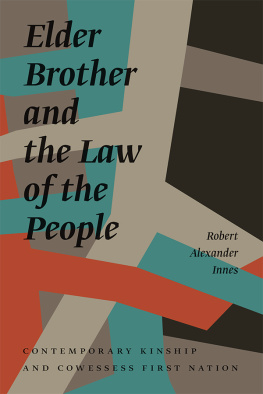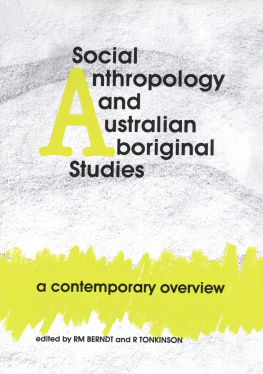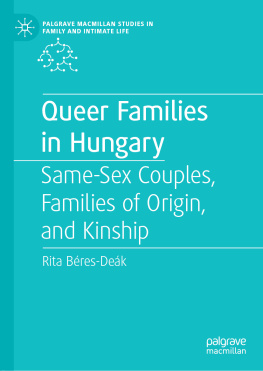Duke University Press Durham & London 2001
Reconfiguring Kinship Studies
Edited by Sarah Franklin & Susan McKinnon




vii
ix
PART I Substantial-Codings: From Blood to Hypertext
PART II Kinship Negotiations: What's Biology Not/Got to Do with It
PART III Nature, Culture, and the Properties of Kinship
PART IV 'R' Genes Us? The Uses of Gene/alogies
PART V Ambivalence and Violence at the Heart of Kinship
2.1 "Map of Lake Superior with Its Rail Road and Steam Boat Connection," 61
2.2 Sketch of "Longitudinal Section of Cliff Mine," 64
2.3 Sketch of "Township No. 47 N. Range 27 W., Marquette County," 66
2.4 Sketch of "Beaver Dam ... Grass Lake," 68-69
2.5 Sketch of "Grass Lake," 70
2.6 "Beaver Dam and Lodge on Escanauby River," 71
3.1 "Dr. Severino Antinori visiting Amsterdam," 88
3.2 Velazquez's Las Meninas, 91
3.3 Van der Leck's Gezin, 93
3.4 Galan's The Family, 94
3.5 "Diagram Illustrating the Paradigm of the Lineage System," 99
3.6 "The effective minimal lineage," loo
3.7 "The domestic family is the matrix of kinship," 101
3.8 "Kinship patterns are not specific in public etiquette or domestic intercourse," 102
3.9 One of the few portraits in The Web of Kinship, 104
3.10 Another portrait from The Dynamics of Clanship, 105
4.1 Instructions for Bailey's Family Ancestral Album, 117
4.2 First page of genealogy for George and Martha Washington, 118
4.3 Tierra simulator display, 121
4.4 Parent programs from John Koza, Genetic Programming: On the Programming of Computers by Means of Natural Selection, 132
4.5 A hybrid cockroach robot, 138
5.1 The cover of the 1955 Cardinal Giant paperback edition of Killen's Youngblood, 158
9.1 Multiple generations of recomposed families descending from Henri of Lyon, 263
9.2 The recomposed families of Elie and Claire, 264
9.3 The recomposed family of Georges and Germaine's son, 265
13.1 Blood streams of the human races, 358
13.2 Dendrogram of human genetic relationships, 359
13.3 Dendrogram of human genetic relationships, 362
13.4 A dendrogram, representing similarity among operational taxonomic units, labeled A, B, C, D, E, 363
13.5 A cladogram, representing shared common ancestry among species, labeled A, B, C, D, E, 365
13.6 Parsimony tree, the shortest network, 367
13.7a-b Alternative genetic relationships of the "races," 368
13.8 Mrs. Burnham, 378

This volume is the result of the Wenner-Gren international symposium New Directions in Kinship Study: A Core Concept Revisited, which took place from 27 March to 4 April 1998 in Palma de Mallorca. We wish to thank the Wenner-Gren Foundation for the rare gift that their international symposium program provided: nine days to think and talk about a topic of common concern in an elegant setting. We are especially grateful to Sydel Silverman for her support and encouragement, as well as the remarkable depth and breadth of her vision about the nature of anthropology; to Laurie Obbink for her brilliant organization of the conference (and for being so calm); to Mark Mahoney for his spirited assistance on site in Mallorca; and to Cori Hayden for her remarkable rapporteurial ricochets. Above all, we thank the participants for their tremendous energy and enthusiasm, their keen and provocative papers, and their good humor, graciousness, and warm congeniality. For comments on earlier drafts of our introduction, we would like to thank Mary Bouquet, Janet Carsten, Charis Thompson, Carol Delaney, Jonathan Marks, Martine Segalen, Verena Stolcke, Marilyn Strathern, and Kath Weston. We are also grateful to Susannah Bowyer and Kim Haslinger for preparing a bibliography of recent work on kinship; to Elizabeth Vann for her superb editorial assistance in preparing the manuscript; and to Charles Kaut for creating the kinship diagrams for Martine Segalen's paper. Finally, we wish to express our appreciation of the Wenner-Gren Foundation's generous support for the production of this volume.
Sarah Franklin and Susan McKinnon
At the core of social and cultural anthropology for decades, and arguably one of the discipline's most distinctive theoretical innovations, the study of kinship is itself symbolic of the anthropological tradition. Like all traditions, it has also undergone periodic reinventions, and it is currently in the midst of a revival that has entailed significant reconfigurations within a range of sites - from rural China to fertility clinics to cyberspace. The new uses of kinship theory, and the novel sites and locations where kinship study is being pursued, open up new possibilities for understanding the age-old question, What is kinship all about? It allows us to look both forward and back- ahead to the as yet little explored worlds of kinship-in-the-making, and back across a rich and varied history of scholarship on kinship and social life.
The chapters in this volume take seriously the challenge to kinship studies posed by new topics such as reproductive technology, international adoption, global capitalism, and virtual life. Kinship study takes on an altered significance in the context of the Human Genome Project or genetic screening programs, and it is to such empirical and theoretical challenges that the contributors to Relative Values have responded. These responses are as varied as their author's disparate interests, but they share in common the effort to begin to articulate a vocabulary of kinship analysis that bridges the unique legacy of historical debate about this concept and its ongoing prominence as a feature of social life.
Kinship is investigated in this volume both as a theoretical concept and a social category, and it is the tension between the two that generates many of our central questions. On the one hand, kinship remains a central concept within anthropology despite having undergone many transformations: indeed, this historical legacy gives the idea of kinship its sustained appeal and enduring flexibility. On the other hand, kinship remains a contested analytic concept. Like all epistemic devices, kinship helps to constitute what it describes so that even imagining its purchase on sets of phenomena, whether in Western societies or elsewhere, maybe seen as ideological or circular, and thus complicit with an unreconstructed version of the anthropological project. Interrogating kinship, then, continues to precipitate lively debate concerning not only what kinship is "all about" but also how its uses index wider changes within anthropology as well as within the societies of which anthropologists are a part.

